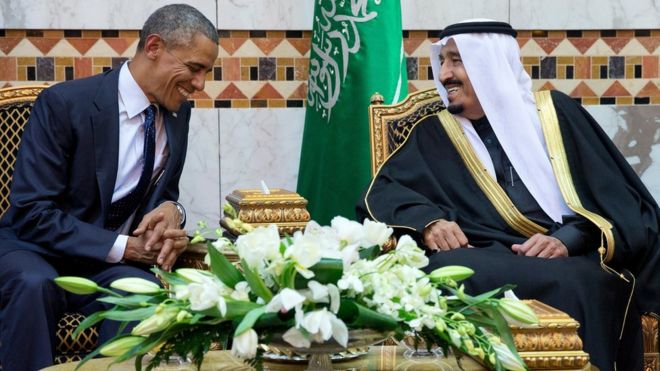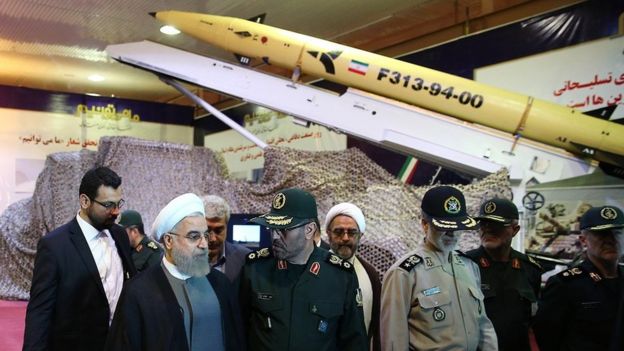Szíriáról, Jemenről, Iránról és fegyverüzletről tárgyalt Obama elnök a szaúdi királlyal
Saudi king meets Obama amid concerns over Iran deal
 Image copyrightAP
Image copyrightAPSaudi Arabia has said it is happy with President Obama’s assurances that the recent nuclear deal with Iran will not imperil the Gulf states.
Saudi Foreign Minister Adel al-Jubeir said his country was satisfied that the deal would contribute to security and stability in the Middle East.
He was speaking after King Salman held talks with Mr Obama in Washington,
It is King Salman’s first trip to the United States since assuming the throne in January.
The foreign minister said he hoped Iran would use the windfall from the lifting of sanctions for its own development rather than engage in what he termed as „nefarious activities in the region”.
„The president explained and affirmed that the agreement prevents Iran from acquiring a nuclear weapon, has a robust and unprecedented inspections regime that includes inspections of all sites… and that has provision for snap back of sanctions should Iran violate the terms of their agreement,” he added.
Gulf states fear that lifting sanctions could allow Iran to extend its support for militant groups and actions across the region they consider destabilising.
The Saudi foreign minister also said assurances had been given to President Obama that efforts would be made to relieve the humanitarian situation in Yemen.
The US has backed a Saudi-led coalition’s attempts to restore the government in Yemen, in its campaign against Houthi rebels.
Human rights activists and humanitarian organisations have criticised Mr Obama’s decision to support the coalition air campaign in Yemen, which has killed hundreds of civilians since March, and the naval blockade that has caused severe shortages of food, fuel and medicine.
Mr Obama pressed King Salman to ensure humanitarian organisations were given unrestricted access to Yemen, where the Saudis are leading a coalition against the Houthi rebel movement.
„We share concerns about Yemen and the need to restore a function government that is inclusive and that can relieve the humanitarian situation there,” Mr Obama said after the meeting.
‘Missile deal’
US-Saudi ties are said to have been strained by Mr Obama’s unwillingness to take military action against Syria’s President Bashar al-Assad, and his support for a nuclear deal that the Saudis fear will ultimately allow Iran to acquire nuclear weapons.
 Image copyrightAFP
Image copyrightAFPIn May, King Salman skipped a summit of Gulf Arab leaders at Camp David, which was widely interpreted as a snub for the US president.
The Obama administration has vowed to make certain that Iran abides by its commitments under the nuclear deal and to do everything it can to „counter Iran’s destabilising activities” in the Middle East once the country’s estimated $56bn (£37bn) of frozen assets are released.
In an effort to reassure its Gulf allies, the US has been working with them to develop a ballistic missile defence system, provide special operations training, authorise arms transfers, strengthen cyber security, engage in large-scale military exercises, and enhance maritime operations to halt illegal Iranian arms shipments.
„We are determined that our Gulf friends will have the political and military support that they need,” Secretary of State John Kerry said on Wednesday.
Senior administration officials told the New York Times that the Pentagon was finalising a $1bn arms agreement that would provide weapons for the Saudi military for the campaign against the jihadist group Islamic State and the Houthi rebel movement in Yemen.
The deal primarily comprised missiles for US-made F-15 fighter jets, the officials said.
Pogár Demeter, az MTI tudósítója jelenti: Washington, 2015. szeptember
A szíriai és a jemeni válságról, az iráni nukleáris programról kötött megállapodás nyomán kialakult helyzetről, valamint egymilliárd dolláros fegyverüzlet véglegesítéséről tárgyalt pénteken Washingtonban Barack Obama amerikai elnök és Szalmán szaúdi király.
A Fehér Ház Ovális irodájában tartott megbeszélést megelőzően Obama kijelentette, hogy Egyesült Államok és Szaúd-Arábia egyaránt aggódik a jemeni helyzet miatt. Egyetértenek abban, hogy az országban helyre kell állítani a működő kormányzást, amely nem lehet kirekesztő, és képesnek kell lennie a humanitárius helyzet enyhítésére.
Washingtont és Rijádot a szíriai válság is aggasztja, ezért a konfliktus lezárását jelentő politikai átmenet eléréséről is tárgyaltak – közölte Barack Obama. Azt mondta, hogy a két ország „rendkívül szoros” együttműködést folytat majd egymással ebben a kérdésben.
Szalmán király, aki januári trónra lépése után először jár az Egyesült Államokban, mélynek, erősnek és kölcsönösen előnyösnek nevezte a két ország kapcsolatát gazdasági, politikai és katonai értelemben egyaránt. Fontosnak mondta, hogy a gazdasági felvirágzás érdekében stabilitás alakuljon ki a közel-keleti térségben.
Szaúd-Arábia óvatos támogatásáról biztosította az iráni nukleáris program korlátozásáról megkötött egyezményt, miután Washington pótlólagos katonai és biztonsági támogatást ígért Rijádnak, amely attól tart, hogy Teherán megerősödik a szankciók feloldását követően.
A The New York Times pénteki száma szerint a washingtoni csúcstalálkozón az Egyesült Államok és Szaúd-Arábia vezetői egy egymilliárd dollár értékű fegyverüzlet részleteit véglegesítik.
A lap szerint az ügylet keretében – amelyet még a kongresszusnak is jóvá kell hagynia – az amerikaiak ezúttal nem adnak el harci repülőgépeket szaúdiaknak. A legnagyobb tételt az F-15-ösökre felszerelhető rakéták jelentik. A The New York Times megjegyezte, hogy a közel-keleti országok közül az Egyesült Államok egyedül Izraelnek fog F-35-ösöket értékesíteni.
Sajtóértesülések szerint egyébként Washington többet vár Rijádtól a Bassár el-Aszad szíriai elnök ellen harcoló felkelők támogatásában. Abban mindkét fél egyetért, hogy a szíriai válság megoldása érdekében Aszadnak távoznia kell a hatalomból.
www.bbc.com/news/world-us-canada-34153624 / MTI / BPI














